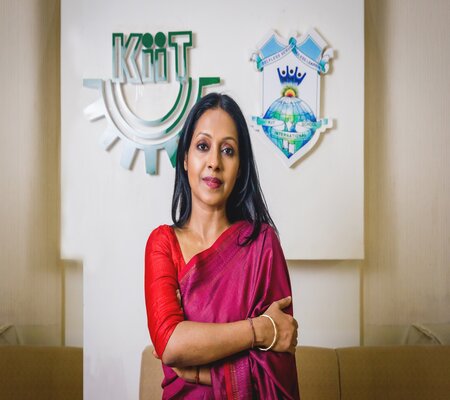Indian Education and Budget 2022 Expectations
 The Indian education realm has witnessed multiple paradigm shifts over the years and even though many pioneering educators have been striving equip the students with the needed skills required to thrive in the modern world, there has been a pertinent industry-academia gap in India. Over the last couple of years, the pandemic has had a negative impact on the Indian education stratum which has brought to the fore-front some of the most obvious drawbacks as well as limitations of the Indian education system. And with more and more students aiming to go abroad for higher education, there are improvements that should happen in India if we want to shine on the global stage and become a knowledge super power.
The Indian education realm has witnessed multiple paradigm shifts over the years and even though many pioneering educators have been striving equip the students with the needed skills required to thrive in the modern world, there has been a pertinent industry-academia gap in India. Over the last couple of years, the pandemic has had a negative impact on the Indian education stratum which has brought to the fore-front some of the most obvious drawbacks as well as limitations of the Indian education system. And with more and more students aiming to go abroad for higher education, there are improvements that should happen in India if we want to shine on the global stage and become a knowledge super power.
With Finance Minister Nirmala Sitharaman set to present the 2022-23 budget on February first, many educators, students, parents and other stakeholders are hoping for positive reinforcements for the Indian education segment. And it is safe to say that there are multiple expectations for higher education in budget 2022 and doubts regarding budget allocation for education in India. More shockingly, there are still many who have doubts regarding why budget 2022 is important and how it is going to impact the Indian education realm going forward. Still, as many will be looking at getting favorable allocation for education in India in the upcoming budget, lets take a look at the thoughts of some pioneering educators and business leaders on budget 2022.
- Dhuwarakha Sriram, Chief of Generation Unlimited (YuWaah) and Youth Development and Partnerships, UNICEF -

"India's 350 million+ young people are the biggest opportunity the country has for economic and social progress. Nurturing their leadership and mindset is the best investment India can make. If we give our young people access to future skills, economic opportunities, and safe spaces, we can unlock a bright future for them while fostering nation-building and societies' collective prosperity. Nearly 4% of our population in rural areas has access to computers compared to 23% in urban areas (Source: 2020 NSO Report on Education). As the pandemic has resulted in a higher pace of technological advances and rapid shift to online learning, addressing digital inequality and supporting young people to gain relevant skills of today's job market and youth entrepreneurship opportunities should be top priorities for the upcoming Union budget 2022. In addition, we must focus on supporting the most marginalized and vulnerable young people, such as young women and people with disabilities, so that no young person is left behind. Collaboration amongst young people, the public sector, private sector, civil society, and academia is essential to address the systemic challenges that keep young people from reaching their full potential.”
- Dr. Mona Lisa Bal, Chairperson, KiiT INTERNATIONAL SCHOOL -

The year 2022 has started with a fresh wave of the pandemic that has further shook the backbone of our education system. The learning loss created by the pandemic needs immediate addressal in the Union Budget 2022. The existing digital divide in the country is no longer a new information. According to UNESCO’s state Education Report 2021, the availability of computing equipment in schools in India has been found to be only 22% and only 19% out of them have an internet facility. The development of digital infrastructure did not receive due consideration in last year’s budget and hence, it is imperative to allocate sufficient funds for the development of a robust and improved digital infrastructure. With physical classes being shut once again, students will be dependent on online classes to continue learning. We must ensure that no student in the country is left behind owing to financial and technological disadvantage. The end of the pandemic is nowhere in sight; therefore, it is essential that we take measures to guarantee that education is not put on hold. The unpredictable nature of our present has made it clear that we need to safeguard our future. It is important that we adapt our education system, pedagogies, and assessments accordingly. Upskilling of teachers is therefore more important than ever now. The economic implication of the pandemic has been adverse, and many have lost their livelihood or have lowered income. Reduction of interest rates on education loans is also required so that students aspiring for higher education are not financially burdened. Implementation of NEP 2020 has been slow, and the upcoming budget also needs to focus on this. Budgetary allocations need to be made for faster implementation of NEP 2020 which has the potential to change our education system for the better. 6 - 10% of the GDP should be allocated towards education. This would lead to a healthy start in the further progress to build a stronger foundation. Opening FDI into education would be helpful in further expansion of technological advancements.
- Aakash Chaudhry, Managing Director, Aakash Educational Services Limited (AESL) -

"With the Union Budget 2022-23 approaching, the young generation has high expectations from the Government especially in four segments – Education & Skill Development, better infrastructure, enhanced employment opportunities and common man's safety & security. We applaud the Government initiatives like the adoption of the NEP, inclusion of new-age courses, and strengthening of the e-learning ecosystem. With Covid completely changing the dynamics of classroom education, we expect there to be a great amount of focus on online education and its infrastructure, especially in the Tier 2,3 cities, in the Budget.
Covid-19 adversely impacted the education system and forced an increase in the rate of school dropouts. The government should announce an attractive stimulus package and provisions for the education industry to bridge the glaring gap between urban and rural populations. The Government also needs to support telecom companies so that they develop better infrastructure, internet connectivity, access to modern devices, ensuring last-mile delivery, quality guidance to the underserved who have been left behind owing to the digital divide. While skilling, reskilling and upskilling will be the new normal, we need to develop more institutes like IITs, IIMs. NIIT, association with foreign universities offering new-age curriculum in sync with global standards to propel future workforce to be industry-ready. The Government should focus on major fund allocation towards innovation, research and development to help talent create lucrative employment opportunities.”
- Prof. Sadashivegowda, Principal, Vidyavardhaka College of Engineering -

" There a lot of challenges in implementing NEP. Structural and educational reforms are needed. Colleges should be able to offer many courses based on the student's choices. For that, the government must provide funding for private organisations. Private higher educational institutions must be provided seed money as there are a lot of research activities that need funding. Presently the government is providing funding to institutes that are ranked within NIRF. NIRF ranking must be ensured in a way that more institutes are enabled so that more funding will happen automatically. Since last two years, students were relatively less active and were not attending offline classes which have made reskilling a need. Current need is to prepare students with futuristic skill sets for future jobs for which faculty must be upskilled accordingly. All these require funding and the budget must focus on this.”
- Ms. Sonali Khan, Managing Director, Sesame Workshop India -

"Last year, to address the Covid 19 exigencies, the education budget was reduced however, today when the country is better prepared to address the pandemic, it’s critical that we increase the allocation to the education budget and find out a way to reduce the increased inequity in access of education. While the RTE act provides free and compulsory education to children of 6 to 14 years of age, given the considerable loss of incomes of a sizable population, it would further be best to ensure the educational and health needs of children by lowering the age from 6 to 3. Aligned with Nipun Bharat, this could be the first step to initiate the ECD mission for the country."
- Tara Singh Vachani - Managing Trustees - Max India Foundation 2.0 -

“During the challenging times of COVID-19, children have been forced to grow up at a pace faster than their previous generations. Owing to constant unpredictable circumstances such as the adoption of, and adaptation to, digital media, ambiguity around educational institutions opening and shutting down, children have undergone mental turmoil. Further, there exists a gulf between the number of children pursuing education in India and the resources available to them. Our aim must be to reduce this gap from widening – through alternative and immersive education models such as social-emotional learning – and offer equal opportunities to each child to enable society to realize its full potential.
Given the fact that the budgetary allocation towards the education sector was reduced to Rs 93,224 crore for 2021-22 from Rs 99,312 crore 2020-21 (also less than the allocation made in 2019-20), a higher allocation towards the education sector this year is vital for further prioritizing the early-stage development of children and catalyzing innovation within the existing pedagogical methods. By taking such pertinent steps, we can mold a population, making them ready for unprecedented situations, and dealing with them in an effective manner."
- Santosh Kumar, Cofounder & CEO, 21K School - The government could focus on working towards strengthening the digital infrastructure in our country, as there
 has been a leap in the online mode of education, and also help create measures to collectively tackle the issues related to providing education to every region for achieving education to all. Gamification in education will provide an immersive and personalised learning experience to students, which will help in better retention of concepts and easy understanding through 3D visualising for tougher concepts. Virtual education itself can aim in reaching every home, empower students with more choices, enhance digital literacy and make a significant impact on the employment and skilling aspects of their career.”
has been a leap in the online mode of education, and also help create measures to collectively tackle the issues related to providing education to every region for achieving education to all. Gamification in education will provide an immersive and personalised learning experience to students, which will help in better retention of concepts and easy understanding through 3D visualising for tougher concepts. Virtual education itself can aim in reaching every home, empower students with more choices, enhance digital literacy and make a significant impact on the employment and skilling aspects of their career.”

